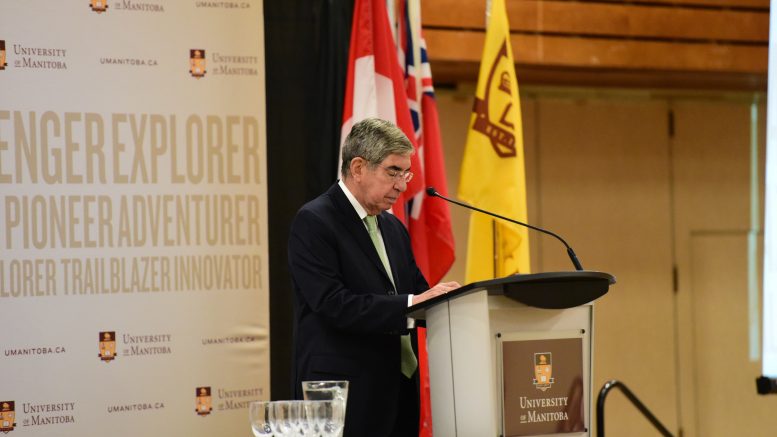The key to achieving peace is positive human development, not violence against its enemies, argued Nobel Peace laureate Oscar Arias in a lecture at the University of Manitoba Sept. 28.
The two-time former president of Costa Rica delivered the 2016 U of M Sol Kanee lecture, “Seeking the Hero of Heroes: Human Development as the Key to Peace,” and pointed to the importance of positive international relationships as an antidote to divisive politics and long-term conflict.
In a globalized world, he said, “we must not use the inhumanity of the few as an excuse to turn our back on humanity as a whole.”
Arias studied law and economics at the University of Costa Rica and served as president of the Central American nation between 1986-1990 and again from 2006-2010. He participates in a number of international organizations and holds approximately 60 honorary university doctorates including from Princeton, Harvard, and Ottawa’s Carleton University.
Arias was awarded the Nobel Peace prize in 1987 after drafting a strategy – widely known as the Arias peace plan – to settle unrest in Central and South America. Signed on by five of the region’s other presidents, the effort culminated in the Esquipulas II accords.
With the funds Arias was awarded with the Nobel Peace Prize, he founded the Arias Foundation for Peace and Human Progress in 1988.
“We are living in terrifying times,” Arias said in his lecture. “Events and celebrations are twisted by violence. People desperate for safety and stability are forced [to flee] to other lands, where they are sometimes met with love, and sometimes with indifference.”
The nature of globalization makes it impossible for nations to isolate themselves, argued Arias. Citing U.S. Republican presidential nominee Donald Trump’s divisive campaign as an example of isolationist rhetoric, Arias said, “We cannot sustain the paradise within our borders if there is hell on the other side.”
Enemies into friends
Arias stressed that the issue cannot be met like the doctor carelessly prescribing medication to address only symptoms – the root causes must be faced head-on.
The real enemies, and the cause of violence, he argued, are poverty, inequality, disease, and illiteracy, which can “create ignorance anywhere in the world.”
Instead of fighting violence with weapons, he said meeting people’s basic needs will work to convert enemies into friends.
Arias said he believes this is not a dream but the only pragmatic way forward. “It is simply common sense.”
He pointed out that rich countries have the resources to address the root cause of the world’s unrest, yet those countries spend their resources on militaries and weaponry that will only further the violence.
“We cannot transform our enemies into friends as long as we continue the unregulated flow of small arms and light weapons across borders,” he said.
The weapons end up in the hands of poor youths, guerrilla groups, and drug cartels, fuelling violence and creating enemies, he said.
The result of this trade, Arias said, can be seen in the refugees fleeing those countries. But imagine what could be achieved, Arias asked, if military spending was reduced and instead invested in people.
Year after year, he said, this argument is ignored.
“We do not ourselves possess the tools to resolve the conflict like the one in Syria […] However, we can maintain the basic building blocks of peace.”
To accomplish that peace, Arias urged governments to act in the long-term to tackle poverty, implement universal education, and open borders so all countries can participate in the global economy.
“If we use the conflicts of today as an excuse to turn inward,” he said, “then we are not only promoting those conflicts, we are also fuelling the conflicts of tomorrow.”



